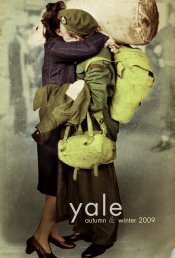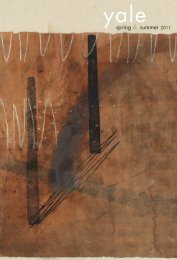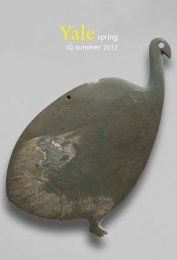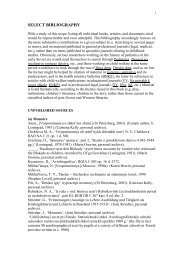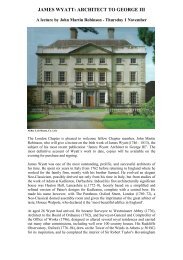View & Download - Yale University Press
View & Download - Yale University Press
View & Download - Yale University Press
You also want an ePaper? Increase the reach of your titles
YUMPU automatically turns print PDFs into web optimized ePapers that Google loves.
The Allure of<br />
the Archives<br />
Arlette Farge • Translated by<br />
Thomas Scott-Railton<br />
Foreword by Natalie Zemon Davis<br />
Arlette Farge’s Le gout de l’archive<br />
is widely regarded as a<br />
historiographical classic. While<br />
combing through two-hundredyear-old<br />
judicial records from the<br />
Archives of the Bastille, Farge was<br />
struck by the extraordinarily<br />
intimate portrayal they provided of the lives of the poor in pre-<br />
Revolutionary France, especially women. She was seduced by<br />
the sensuality of old manuscripts and by the revelatory power of<br />
voices otherwise lost. In The Allure of the Archives, she conveys<br />
the exhilaration of uncovering hidden secrets and the thrill of<br />
venturing into previously unknown dimensions of the past.<br />
Originally published in 1989, Farge’s classic work communicates<br />
the experience of archival research while sharing astonishing<br />
details about life under the Old Regime in France.<br />
Arlette Farge is director of research in modern history at the<br />
Centre National de la Recherche Scientifique in Paris.<br />
Thomas Scott-Railton has translated for Annales: Histoire,<br />
Sciences sociales and New Global Studies. Natalie Zemon Davis<br />
is professor of history at the <strong>University</strong> of Toronto.<br />
The Lewis Walpole Series in Eighteenth-Century Culture and History<br />
October 150 pp. 210x140mm.<br />
HB ISBN 978-0-300-17673-5 £18.99<br />
Translation rights: Les Editions du Seuil, Paris<br />
History 37<br />
The Field of<br />
Cloth of Gold<br />
Glenn Richardson<br />
Glenn Richardson provides the<br />
first history in more than four<br />
decades of a major Tudor event:<br />
an extraordinary international<br />
gathering of Renaissance rulers<br />
unparalleled in its opulence,<br />
pageantry, controversy and<br />
mystery.<br />
Throughout most of the late<br />
medieval period, from 1300 to 1500, England and France<br />
were bitter enemies, often at war or on the brink of it.<br />
In 1520, in an effort to bring conflict to an end, England’s<br />
monarch, Henry VIII, and Francis I of France agreed to meet<br />
at ‘the Field of Cloth of Gold’. In the midst of a spectacular<br />
festival of competition and entertainment, the rival leaders<br />
hoped to secure a permanent settlement as part of a Europeanwide<br />
‘Universal Peace’. Richardson offers a bold new appraisal<br />
of this remarkable historical event, describing the preparations<br />
and execution of the magnificent gathering, exploring its<br />
ramifications, and arguing that it was far more than the<br />
extravagant elitist theatre and cynical charade it historically has<br />
been considered to be.<br />
Glenn Richardson is reader in early modern history at<br />
St. Mary’s <strong>University</strong> College, London.<br />
November 288 pp. 234x156mm. 16 pp. b/w illus.<br />
HB ISBN 978-0-300-14886-2 £35.00<br />
A Restatement<br />
of Religion<br />
Swami Vivekananda and the<br />
Making of Hindu Nationalism<br />
Jyotirmaya Sharma<br />
In this third instalment of his<br />
comprehensive history of ‘India’s<br />
religion’ and reappraisal of Hindu<br />
identity, Professor Jyotirmaya<br />
Sharma offers an engaging portrait<br />
of Swami Vivekananda and his relationship with his guru, the<br />
legendary Ramakrishna. Sharma’s work focuses on<br />
Vivekananda’s reinterpretation and formulation of diverse<br />
Indian spiritual and mystical traditions and practices as<br />
‘Hinduism’ and how it served to create, distort and justify a<br />
national self-image. The author examines questions of caste<br />
and the primacy of the West in Vivekananda’s vision, as well as<br />
the systematic marginalisation of alternate religions and<br />
heterodox beliefs. In doing so, Professor Sharma provides<br />
readers with an incisive entryway into 19th- and 20th-century<br />
Indian history and the rise of Hindutva, the Hindu nationalist<br />
movement.<br />
Jyotirmaya Sharma is professor of political science at the<br />
<strong>University</strong> of Hyderabad, India.<br />
September 328 pp. 234x156mm.<br />
HB ISBN 978-0-300-19740-2 £25.00<br />
Forgotten Voices of<br />
Mao’s Great Famine,<br />
1958–1962<br />
An Oral History<br />
Zhou Xun<br />
In 1958, China’s revered leader<br />
Mao Zedong instituted a programme<br />
designed to transform his giant<br />
nation into a Communist utopia.<br />
Called the Great Leap Forward, Mao’s grand scheme – like so<br />
many other utopian dreams of the 20th century – proved a<br />
monumental disaster, resulting in the mass destruction of<br />
China’s agriculture, industry and trade, while leaving large<br />
portions of the countryside forever scarred by man-made<br />
environmental disasters. The resulting three-year famine<br />
claimed the lives of more than 45 million people in China.<br />
In this remarkable oral history, survivors of the cataclysm share<br />
their memories of devastation and loss. Powerful and deeply<br />
moving, this unique remembrance of an unnecessary and<br />
unhindered catastrophe illuminates a dark recent history that<br />
remains officially unacknowledged by the Chinese government.<br />
Zhou Xun is a lecturer in modern history at the <strong>University</strong> of<br />
Essex. She is the author of The Great Famine in China,<br />
1958–1962: A Documentary History.<br />
January 288 pp. 210x140mm. 1 b/w illus.<br />
HB ISBN 978-0-300-18404-4 £25.00*




